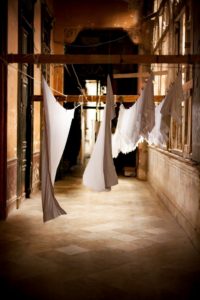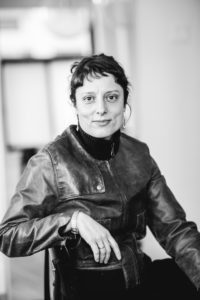Last summer I pitched a small essay to carte blanche because I wanted to write about an out-of-print novel that I had discovered several years before. The author has long since passed away, and the book itself has been all but forgotten: with the exception, perhaps, of a handful of people, most of whom are outside of the literary community and who were interested in the life of the writer, who was a scientist. The novel received lukewarm reviews following its publication in the 1960s. After a small print run, it seems to have disappeared altogether, besides a handful of copies from online used bookstores, and one I found in a book saleroom tucked behind a torn Atlas and a Baby-Sitters Club boxed set.
The novel sparked a question for me that I really wanted to answer: what happens when a book is reviewed unfavourably, when it fails in terms of plot and character development, but can still serve as important social commentary for its time? And despite the corny dialogue and narrative loose ends in his fiction that the author deployed to purvey them? In this case, the book contributed to biographical knowledge of the writer, whose thoughts and insights and the fiction he deployed to veil his own anxieties were important because of what it tells us about science during his era.
So when I found this novel a few years ago, I felt the need to write something about its historical worth, even if I had to throw in a few obligatory examples of how it didn’t quite work as a piece of literary fiction, which the author had presumably hoped it to be. I wanted to write about that failure, but what that failure could tell us about him, about his family, and the period in which he lived.
That was until I struck up a friendship with the writer’s family.
At first I thought it would be a one-time encounter, but it became an ongoing friendship that I hope will grow and last for a very long time.
Getting to know the family of the novelist has enriched my life in so many ways. It has extended my social network but also brought me back to my own family roots, which are uncannily similar to theirs. There are other strange convergences that seem to trail along with this friendship. Like last fall, when I corresponded with a writer/historian whose own work had inspired me and to whom I reached out when I needed an appraisal on a few possessions that had belonged to my father, who died two summers ago. In a roundabout way it came up that this historian was also close to family members of the novelist, too.
While visiting one of the author’s grandchildren, I discovered an old wooden chair in their living room. It had been lovingly refurbished and it also looked oddly familiar. I mentioned to my hosts that I was sure that my family had once owned a similar chair, but that we had thrown it in the trash after a few of the slats had been broken. They explained that they had found the chair with broken slats on the street–and they named the street where my family’s old home was located, as well as dates that would roughly correspond to years when I remember the chair being tossed to the curb.
I had become friends with the descendants of someone I wanted to write about and whose fictional work I had hoped could be seen as evidence of the deep anxieties and fears that haunted him as a man of science. Meanwhile, his grandchildren had welcomed me into their personal lives. They had shared their home with me. They had salvaged my family’s trash and made it beautiful again. They were offering me a seat in their living room on what is likely my own chair. I became unsettled about the space I was taking up in their lives. Everything felt a little weird.
So now I am driven by another question: when should you abandon a writing project when it may affect the people you know? If things were in reverse, and they were sitting in my living room on a chair that I had salvaged from their trash, would I want them to write about my family matters?
No.
True, this was a very small writing project. Perhaps worth an essay or two. This wasn’t some epic family biography. It was blogpost.
But this was more about me and my own limits–no–my severe limitations as a writer and thinker, as someone who will not traipse out of a certain comfort zone because I actually value this friendship (and the idea of friendship in general) over any potential writing material. I am not sure if this makes me a coward, lacking in motivation or ambition. Perhaps too much empathy kills a good story, and possibly good writing. Or maybe it enhances the stories we choose to write rather than the ones we don’t. I don’t know.
The writer Joan Didion wrote about her family and her relatives and friends. Janet Malcolm of The New Yorker sat at the kitchen table of writer/psychoanalyst Jeffrey Masson, whom she wrote about extensively in In the Freud Archives and then was subsequently sued by him for libel. Malcolm’s work includes sitting down to an awful lot of dinners with people whose words and conversations she has recorded and whose flustered airs or behaviour she described unflatteringly in her work on Sylvia Plath. She parked her car outside the home of Ted Hughes and snooped about and then wrote about that while being in correspondence with Hughes’ sister, Olwyn. While corresponding with Olwyn Hughes she wrote about her observations of the correspondence in a way that wasn’t necessarily flattering, either. Getting to the truth of things can be insulting for your subjects, and hurtful if intent is unclear, or transgress assumptions about the duty of friendship. In Malcolm’s case she never tried to become a friend of the Hughes family. But to build enough trust to get a story means, in some cases, to pose as an ally.
Meanwhile, my piecemeal project (this was a blogpost, for goodness sakes) had started to weigh heavier on me than an unabridged translation of War and Peace. Perhaps the fact that I remain so bothered about this means I am deferent to the idea that not writing is sometimes better than writing. Maybe for the sake of convenience and perhaps also because you have to possess a little courage to let go of a project. Sometimes.
The Polish poet and Nobel Prize laureate, Wislawa Szymborska, has a poem called Discovery that captures at some level the discomfort I feel, even if she was talking about the colossal damage done by science (think: the atom bomb). In the poem, she describes the honourable act of a scientist destroying information that could be potentially harmful.
I believe in the burning of his notes,
burning them into ashes,
burning them to the last scrap.
I believe in the scattering of numbers,
scattering them without regret.
This poem has always appealed to me, and is perhaps one of the few (with the exception of lines from Madame Bovary and some childhood rhymes) I have attempted to memorize. I am interpreting Szymborska’s poem very loosely for my own purposes, but I believe in the basic premise of keeping secrets and letting go of the work, and maybe even destroying it. This feeling and belief is not necessarily founded in any particular philosophy or rulebook or school of ethics. And that’s for good reason: if the idea of burning notes is misused by a society bent on totalitarian principles or dictated by censorship it could have disastrous consequences. It already has.
But writing hurts people. Is that always necessary? Ann Patchett’s oft-praised Truth and Beauty (which first appeared as an epic essay in New York Magazine) on her friendship with the brilliant author Lucy Grealy, who died of a heroin overdose, apparently came at an enormous price for Grealy’s grieving family. Critics of Rachel Cusk’s non-fiction about motherhood and divorce have often expressed their indignation at the way she describes the real-life people (her children, her ex-husband) in her books. “It was his story,” Cusk writes of her traumatic separation from her husband in The Guardian newspaper, “and lately I have come to hate stories. If someone were to ask me what disaster this was that had befallen my life, I might ask if they wanted the story or the truth” (italics mine). Cusk’s 2009 memoir of her time in Italy with her family had to be pulped when someone recognized themselves in her book. I admire her writing and her ability to distinguish between the stories we tell ourselves to smooth over the gritty details from the truth–and in such a sardonic way about her own life and loved ones surrounding her. I find it extraordinary, even though I can’t muster up the strength to write a blogpost.
Journalists like Didion and Malcolm hunt after the truth and have decided that the best way to get it is to sit down to dinner and go to parties and gigs and hospital bedsides and write about every last detail. They do this not to grow more empathy and protect people, or cultivate new friendships and nurture old ones, but to write stories that need to be told. They weren’t there to make friends. They were there to write the truth.
Recently I watched the wonderful documentary Bloody Daughter by director Stéphanie Argerich, in which she explores her family life and the effect that her mother, a musical genius and one of the world’s finest pianists, Martha Argerich, had on her and her two sisters. The movie is beautiful. And painful. It was most likely healing for the filmmaker even if it captured family tensions on screen that were awkward to record and certainly uncomfortable for the audience to watch. Now the film is out there for all the world to see: a portrait of a family that is inspiring and troubling in its imperfections, its creative genius and revealing in the amount of chaos and confusion the daughters grew up with. Now the family story is out there, and everyone has the license to share their reactions and opinions about it. To give it a “thumbs up” or “thumbs down” on YouTube as well as laugh during the scenes where the Argerich family dance to the Mad Adventures of Rabbi Jacob. Bloody Daughter was an act of bravery. It was also the mark of a creative soul already disabused of the notion that the goal of keeping family secrets is psychologically healthy or even obtainable. Still, it is a family portrait by a member of its own clan. Not a friend.
The film Bloody Daughter has changed my life, just as my life has changed by choosing not to write and abandon my diminutive blogpost. I am not sure if I have made a mistake. I am not sure if there is any moral high ground to take. But for now, all I want to do is sit on the chair that my family threw out and which has been lovingly restored by someone from another family who salvaged it. I want to eat long dinners while sitting on the chair and talk until sundown. And I’ll put away my pen.
Deborah Ostrovsky was shortlisted for the 3Macs carte blanche Prize for her piece “Holy Treasures” that appeared in issue 23 of this magazine. She was shortlisted for the CBC Quebec Writing Competition for fiction and has attended the Banff Centre’s Literary Journalism program and the Wildbranch Writing Workshop in the U.S. Her writing appears in McSweeney’s Internet Tendency, Tablet, Geist and Maisonneuve. Recently her essay “Les enfants du roi” was translated into French in Courrier International.


